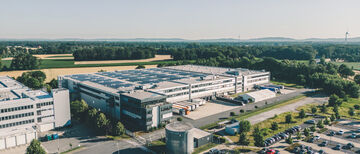Innovation and sustainability
How does Industry 4.0 technology affect sustainability in logistics?

In this interview, we spoke to our colleague Karoline Kowalik, Logistics Engineer and PhD student in the field of Innovation and Sustainability at Maastricht University, about the effect of Industry 4.0 technologies on sustainability in logistics. Karoline's latest paper deals with the correlation of innovative technologies and sustainability strategies in logistics. The primary research question was the impact of Industry 4.0 technologies on economic, environmental and social sustainability in the logistics sector.
Can you give us a brief introduction to the topic of Industry 4.0 in logistics to get us started? What are Industry 4.0 technologies in logistics?
Industry 4.0 (I4.0) or the Fourth Industrial Revolution emphasizes digitization, network communication, automation technologies, and analytics.
Industry 4.0 technology (I4.0T) is characterized by its connection to information technology and other internet-linked technologies like the Internet of Things (IoT), forming Cyber-Physical Systems (CPS). This connectivity, aided by Big Data and information systems, enhances transparency, decision-making, and autonomous learning within systems. I4.0 technologies, in comparison to I3.0 technologies, deal with a variety of individually unique products and situations, take decisions autonomously, collaborate with humans, and provide interconnectivity and transparency of a whole value chain instead of single processes.
Amongst other innovation technologies, key I4.0T in logistics include physical technologies such as advanced robotics, Cyber-Physical Systems (e.g. RFID tags) and Internet of Things, but also digital technologies like Augmented and Virtual Reality, Cloud Computing and Big Data, and simulation and digital twins.
Can you elaborate on the current challenges faced by logistic service providers in balancing order fulfillment services and sustainable business practices?
In the dynamic world, the logistics landscape faces transformative challenges such as post-pandemic changes, embracing AI, going green, and enhanced connectivity. Global e-commerce, projected to reach over 8.1 billion by 2026, drives industry transformation, with consumers demanding seamless experiences and sustainability. The rise of Industry 4.0 technologies, including AI, big data, and robotics, presents both opportunities and challenges. Sustainability is not just a buzzword, but is now required by, for example, the EU Corporate Sustainability Reporting Directive (CSRD). Additionally, shifts in societal attitudes, especially among environmentally conscious Generation Z consumers, influence corporate practices. Another challenge also includes resources scarcity like land and raw material, but also rising labor costs.
To navigate these challenges, a comprehensive approach is vital, involving seamless digital integration, adopting sustainable practices, and staying agile with adaptive strategies. It's not just about staying competitive; it's about ensuring our long-term success in this dynamic logistics sector.
What does sustainability mean in logistics? Which levels can be considered?
Sustainability is often regarded very limited, but it goes beyond CO2 emissions, involving economic, social, and environmental factors. Aligned with UN SDGs, the Triple Bottom Line approach assesses success holistically. Amongst many impact categories, the social dimension prioritizes well-being, ethics, and quality of life. The economic dimension emphasizes profit, efficiency, and market performance. The environmental dimension evaluates waste, resource efficiency, CO2, and pollution.
Ultimately, maintaining balance among the three pillars is crucial for a company's sustainability.
How does the pressure from governments, clients, and end consumers influence the strategic shift of logistic providers towards sustainability in their value chains?
Despite the introduction of sustainable development by the Brundtland Commission in 1987 and the SDGs in 2015, there has been insufficient progress due to the lack of commitment and consequent action by governments and businesses. The trilateral sustainability framework, once a source of competitive advantage has now become a imperative in light of the Paris Agreement on Climate Change from 2015 and more recently new regulations like the EU CSRD. These regulations force companies to disclose additional social and environmental metrics, pressuring them to adopt sustainable practices and rethink definitions of value and cost.
While two-thirds of executives think sustainability should be integrated into their company’s business strategy, only 38% report actual integration. Alongside regulatory changes, a shift in mindset among younger consumers, particularly Generation Z, urges companies to embrace sustainability or face negative publicity and sales loss. This creates incentives for companies to become more sustainable. Ultimately, to meet governmental goals and consumer expectations, sustainability needs to become a fundamental strategic goal.

It's time to break free from the limitations of the past. Let's adopt a visionary approach to decision-making that looks beyond our walls and positions us for success in a constantly evolving business landscape.
Karoline Kowalik Logistics Engineer and PhD student in the field of Innovation & Sustainability
The effect of Industry 4.0 on sustainability and bridging Industry 4.0 and Sustainability: How do Industry 4.0 technologies contribute to addressing challenges in downstream areas like warehouse and order fulfillment?
Embracing Industry 4.0 technologies offers our logistics service provider a strategic advantage in navigating market disruptions: Firstly, these technologies can drive market growth by increasing throughput and streamlining processes, enabling us to effectively handle more orders and manage expansion seamlessly. Secondly, in addressing resource shortages, Automated Storage and Retrieval Systems (ASRS) not only boost storage density but also alleviate real estate concerns. Additionally, these technologies contribute to reducing the need for Full-Time Equivalents, helping us fill workforce gaps efficiently. Furthermore, the integration of digital and data solutions enhances supply chain transparency, meeting and exceeding customer expectations through value-added services and improved responsiveness. In terms of competition, strategic investments in Industry 4.0 can positively impact economic sustainability, allowing us to optimize costs and stay competitive against new market entrants. Lastly, the adoption of digital and data technologies not only contributes to environmental sustainability but also enhances the work experience for our employees, especially with the positive impact of robotics.
In summary, leveraging Industry 4.0 technologies positions logistics provider to proactively address challenges, capitalize on growth opportunities, and create positive impacts across operational efficiency, sustainability, and customer satisfaction.
Based on the results in your whitepaper, what are the identified impacts of Industry 4.0 technologies on economic, environmental, and social sustainability for logistic service providers?
I4.0T might be a way to deal with sustainability ambitions but it will not be easy to develop a right corporate strategy that can tick all the boxes without any trade-offs. Although Industry 4.0 technology can have a net positive impact on economic and social sustainability, it might have a positive or even negative on the environmental sustainability of companies.
Regarding economic sustainability, I4.0T’s key advantage is a lower total cost of ownership over time. Embracing I4.0T leads reduces Full-Time Equivalent (FTE) costs, minimizes space requirements, and enhances efficiency, leading to lower infrastructure costs like rent. Process optimization and reduced errors contribute to higher economic activity, while fostering supply-chain resilience by dealing with uncertainties. However, challenges include higher initial investments, increased running costs, and the need for strategic planning. Despite these considerations, I4.0T remains a pivotal driver for economic sustainability and long-term success in business.
Looking at environmental sustainability, drawing clear conclusions is challenging. The role of I4.0T in promoting ecological sustainability depends on the specific technology used and ecological indicators considered, leading to potentially positive or negative effects. Assessing the impact, practitioners express optimism toward software technology, recognizing hardware's higher resource consumption and higher CO2 emissions. Addressing negative externalities is crucial, including increased virgin material consumption, elevated energy usage, and potential rebound effects on consumerism. Conducting a life-cycle assessment of I4.0T is essential for accurate comparison with alternatives, considering its entire production-usage-waste cycle. A comprehensive analysis helps identify opportunities for reduced environmental impact while capitalizing on I4.0T benefits, such as enhanced downstream efficiency, decreased CO2 production, intelligent resource utilization, circular economy facilitation, and improved transparency through product data tracking.
Last, I4.0T is a powerful tool for driving social sustainability, delivering benefits that can positively impact businesses and society. Embracing innovative technologies enhances brand image, attracts and retains B2B partners, creates an attractive workplace, and improves transparency for supply-chain partners, customers, and consumers. However, upskilling workers is crucial to ensure they possess the necessary skills for success in a rapidly evolving environment and do not feel replaced. Moreover, companies need avoid shifting problems geographically, such as upstream mineral sourcing or production.
In conclusion, Industry 4.0 technology can have a net positive impact on economic and social sustainability, but an unpredictive impact on environmental sustainability. Only (!) by gaining an understanding of the total impact of a new technology, we can understand the true value of technology.
Outlook and your call to action: What do you advice to management (decision-makers) and logistic solutions planners?
Recognizing the significant financial potential in advanced technologies, decision-makers must proactively consider all stakeholders. Industry experts stress the urgency for our logistics service provider to integrate current trends into decision-making or face risks of falling behind.
Let's question why we stick to outdated approaches hindering progress and Industry 4.0 transformation. Embracing change management and being open to new ways positions us for success in the evolving business landscape. It's time to break free from past limitations, adopt a visionary approach, and actively embrace change for continued growth and competitiveness.

